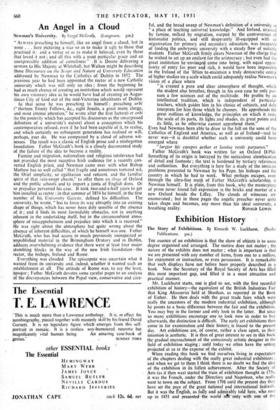An Angel in a Cloud -
Newman's University. By Fergal McGrath. (Longman,. 305.)
" ALWAYS preaching to himself, like an angel from a cloud, but in none . . . here picturing a vice so as to make it ugly to those that practised it: and a virtue so as to make it beloved, even by those that loved it not ; and all this with a most particular grace and an unexpressible addition of comeliness " It is Donne delivering a sermon to His Majesty at Whitehall, but Walton might be describing those Discourses on the Scope and Nature of University Education addressed by Newman to the Catholics of Dublin in 1852. The previous year he had been appointed the rector of a new Catholic university which was still only an idea ; from the beginning he had as much chance of creating an. institution which would represent his own visionary idea as he would have had of creating an Augus- tinian City of God out of the mid-Victorian inhabitants of Dublin. In that sense he was preaching to himself ; preaching urbi (" thirteen Trinity Fellows, &c., eight Jesuits, a great many clergy, and most intense attention," he wrote after the first lecture) et orbi (to the posterity which has accepted his discourses as the unsurpassed definition of a university's nature) about a conception which his contemporaries refused, even if he had been capable of it, to realise, and which certainly no subsequent generation has realised or will, perhaps, ever do. He was compassed by a cloud of adverse wit- nesses. The result was a classic of English prose and a misbegotten foundation. Father McGrath's book is a closely documented study of the failure of the idea to become a reality. Famine and migration, nationalism and religious intolerance had not provided the most receptive Irish audience for a recently con- verted English priest, and Newman came over with what Bishop Mathew has so well called " that fragile and sometimes tortured wit, the Oriel simplicity, so egalitarian and reticent, and the familiar spirit of that rain-swept charm," to offer them an e/oge of Oxford and the public schools and to import a junta of English dons. Or so prejudice perverted his case. It took two-and-a-half years to get him installed as rector ; in that summer of 1854 he himself, in the first number of his University Gazette. defined his difficulties. The university, he wrote, " has to force its way abruptly into an existing shape of things, which has never been duly sensible of the absence of it ; and it finds its most formidable obstacles. not in anything inherent in the undertaking itself, but in the circumambient atmo- sphere of misapprehension and prejudice into which it is received." He was right about the atmosphere but quite wrong about the absence of inherent difficulties, of which he himself was one. Father McGrath, who has had access to much previously uninspected or unpublished material in the Birmingham Oratory and in Dublin, adduees overwhelming evidence that there were at least four major stumbling blocks in the way of the new Irish foundation—the rector, the bishops, Ireland and Rome.
Everything was clouded. The episcopate was uncertain what it wanted from its university and, indeed, whether it wanted such an establishment at all. The attitude of Rome was, to say the least, Opaque ; Father McGrath devotes some careful pages to an analysis of the discrepancies between the Papal view, conservative and care- ful, and the broad sweep of Newman's definition of a university as " a place of teaching universal knowledge." And Ireland, strained by famine, milked by migration, warped by the controversies of nationalist politics, and still desperately ill-equipped with an organisation for primary and secondary education, was incapable of feeding the embryonic university with a steady flow of suitable students Father McGrath firmly clears Newman of the charge that he wished to set up an enclave for the aristocracy ; but even had the great institution he envisaged come into being, with equal oppor- tunity of entry for poor and rich, it would have been impossible in the Ireland of the 'fifties to maintain a truly democratic centre of higher studies on a scale which could adequately realise Newman's vision of a place where
" is created a pure and clear atmosphere of thought, which the student also breathes, though in his own case he only pur- sues a few sciences out of the multitude. He profits by an intellectual tradition, which is independent of particular teachers, which guides him in his choice of subjects, and duly interprets for him those which he chooses. He apprehends the great outlines of knowledge, the principles on which it rests, the scale of its parts, its lights and shades, its great points and its little, as he otherwise cannot apprehend them."
Even had Newman been able to draw to the full on the sons of the Catholics of England and America, as well as of Ireland—and he never was—it is doubtful whether such a university could have emerged where "Iargior hic carnpos aether a himine vestit purpureo."
Father McGrath's book was written for an Oxford D.Phil. Something of its origin is betrayed by the meticulous alembication of detail and footnote ; the text is burdened by tertiary references and authorities. But everything is here for a study of the intricate problems presented to Newman by his Pope. his bishops and the country in which he had to work. What perhaps escapes, even through the ultra-fine mesh of Father McGrath's .scholarship, is Newman himself. It is plain, from this book, why the masterpiece of prose never found full expression in the bricks and mortar of a new Oxford beside the Liffey. The clouds of witnesses are enumerated ; but in these pages the angelic preacher never quite takes shape and becomes, any more than his ideal university, a






































 Previous page
Previous page